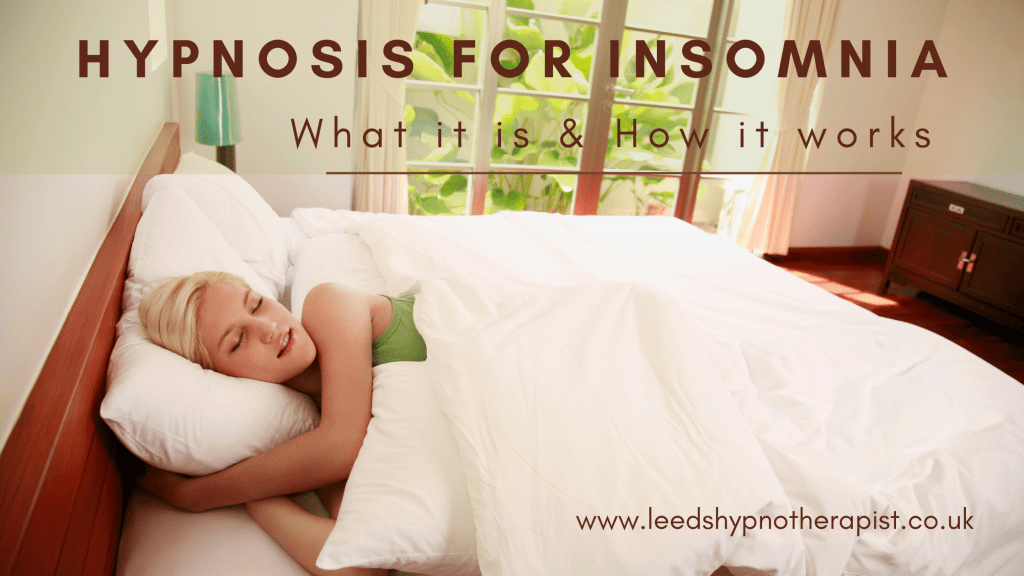Sleep hypnosis for insomnia is a form of hypnosis that is used to help people relax and fall asleep. It has been shown to be an effective treatment for people who have difficulty sleeping and can help them get the rest they need to function properly during the day. Hypnotherapy for insomnia can be used to help people relax and fall asleep, as well as to ease the symptoms of sleep disorders. Hypnosis can also help people who suffer from nightmares or sleep paralysis. In this article, we are going to look at the various issues around insomnia and how if you are struggling with sleep hypnosis can help you to resolve that.
What is insomnia?
Insomnia is a sleep disorder that is characterized by difficulty falling asleep and/or staying asleep. It can be caused by a variety of factors, including stress, anxiety, medication, and health conditions. Insomnia can have a negative impact on quality of life, and can lead to problems such as fatigue, irritability, and difficulty concentrating.
In severe cases, insomnia can also lead to more serious health problems such as heart disease, high blood pressure, and diabetes. People with insomnia often report feeling exhausted and unrefreshed even after a full night’s sleep, which can affect their ability to function during the day.
What are the other different types of sleep disorders?
Sleep disorders are defined by problems with sleep quality, quantity, or timing. They can cause difficulty falling asleep, staying asleep, or obtaining the necessary amount of deep sleep. Sleep disorders can also lead to excessive daytime sleepiness, which can negatively impact quality of life. Some of the most common one include insomnia, narcolepsy, restless leg syndrome, and obstructive sleep apnea. Below we will briefly look at each of the sleep disturbances in turn.
Sleep apnea
Sleep apnea is a sleep disturbances that is characterized by pauses in breathing or shallow breaths during sleep. It can be caused by a variety of factors, including obesity, smoking, and age. Sleep apnea can have a negative impact on quality of life, and can lead to problems such as fatigue, irritability, and difficulty concentrating.
In severe cases, sleep apnea can also lead to more serious health problems such as heart disease, high blood pressure, and diabetes. People with sleep apnea often report feeling exhausted and unrefreshed even after a full night’s sleep, which can affect their ability to function during the day.
Restless leg syndrome
Restless leg syndrome (RLS) is a sleep disturbance that is characterized by an uncontrollable urge to move the legs. This can lead to difficulty falling asleep and staying asleep. RLS can also cause problems such as fatigue, irritability, and difficulty concentrating.
In severe cases, RLS can also lead to more serious health problems such as heart disease, high blood pressure, and diabetes. People with RLS often report feeling exhausted and unrefreshed even after a full night’s sleep, which can affect their ability to function during the day.
Narcolepsy
Narcolepsy is a sleep issue that is characterized by excessive daytime sleepiness. It can be caused by a variety of factors, including stress, anxiety, medication, and health conditions. Narcolepsy can have a negative impact on quality of life, and can lead to problems such as fatigue, irritability, and difficulty concentrating.
In severe cases, narcolepsy can also lead to more serious health problems such as heart disease, high blood pressure, and diabetes. People with narcolepsy often report feeling exhausted and unrefreshed even after a full night’s sleep, which can affect their ability to function during the day.
What is hypnosis for insomnia and how does it work
Hypnotherapy for insomnia is a form of therapy that is used to help people who are struggling with sleep issues. It involves going into a trance-like state in which the person is more open to suggestion. In this state, the therapist can help the person to address the underlying causes of their insomnia and work on resolving them.
Using hypnosis to cure insomnia is thought to work by helping the person to relax and de-stress. It can also help to address any underlying psychological issues that may be contributing to the problem. By addressing these issues, hypnosis can help to resolve the insomnia and improve sleep quality.
If you are struggling with insomnia, hypnosis may be a treatment option worth considering. It is important to speak to a qualified hypnotherapist to ensure that it is the right treatment for you.
The benefits of hypnotherapy for insomnia
There are many benefits of hypnotherapy for insomnia. Some of the most notable include:
– improved sleep quality
– reduced stress and anxiety
– improved concentration and focus
– reduced fatigue and irritability
All of these benefits can have a positive impact on quality of life. When someone is struggling with insomnia, hypnosis can help them to get the sleep they need to function optimally during the day. This can be extremely beneficial for both personal and professional life.
How to use hypnotherapy for insomnia including self-hypnosis
There are a few different ways to use hypnotherapy for insomnia. One way is to attend sessions with a qualified therapist. This is often the most effective way to treat insomnia, as the therapist can help you to address the underlying causes of your sleep issues.
Another way to use hypnotherapy for insomnia is by using self-hypnosis. This involves learning how to put yourself into a trance-like state and then using this state to address the underlying causes of your insomnia. There are many guides available online that can teach you how to do this.
What is self-hypnosis and how can it help me to get better sleep?
Self-hypnosis is a way to use hypnotherapy for insomnia that involves learning how to put yourself into a trance-like state and then using this state to address the underlying causes of your insomnia. There are many guides available online that can teach you how to do this.
To use self-hypnosis for insomnia, you will first need to learn how to put yourself into a trance-like state. This can be done by following a guide or tutorial online. Once you have learned how to do this, you can use this state to address the underlying causes of your insomnia.
In order to use self-hypnosis to fall asleep, you will need to be motivated and committed to resolving and treating sleep disorders. It is important to be patient and allow yourself enough time to see results. Some people may find that it takes a few weeks or months before they see significant improvements in their sleep quality.
Whichever way you choose, sleep hypnosis can be a very effective way to improve sleep outcomes and improve sleep quality.
The risks associated with hypnotherapy for insomnia
Sleep hypnosis is a form of therapy that is used to help people who are struggling with getting restorative sleep. It involves going into a trance-like state in which the person is more open to suggestion. In this state, the therapist can help the person to address the underlying causes of their insomnia and work on resolving them.
Hypnotherapy for insomnia is thought to work by helping the person to relax and de-stress. It can also help to address any underlying psychological issues that may be contributing to the problem. By addressing these issues, hypnosis can help to resolve the insomnia and improve sleep quality.
If you are struggling with insomnia, hypnosis may be a treatment option worth considering. However, it is important to speak to a qualified hypnotherapist to ensure that it is the right treatment for you.
There are a few risks associated with hypnotherapy for insomnia, however, all of these can be addressed by using hypnosis. If you have a tendency towards having some of these issues you need to mention it to your chosen hypnotherapist. Some of the most notable include:
– increased risk of developing an addiction to alcohol or drugs
– increased risk of developing anxiety or depression (possibly even panic attacks)
– increased risk of experiencing side effects from medication
All of these risks should be discussed with a qualified hypnotherapist before starting hypnotherapy for insomnia therapy. If you already have the above issues it would be helpful to work on these at the same time as they are likely contributing towards you having insomnia.
FAQs about hypnotherapy for insomnia
Here are some common questions that are asked about using hypnotherapy for insomnia. If you have a question that isn’t listed below, please do use our contact form.
What is self-hypnosis and how can it help me to get better sleep?
Self-hypnosis is a method of taking yourself into the hypnotic state in order to create your own healing. Whether you are working with a hypnotherapist or you are using self-hypnosis, I want to let you into a little secret….
It’s all self-hypnosis!
The difference when working with a hypnotherapist is that they are acting as a guide in order to help you. The hypnotherapists role is to be the one to help you through any difficult issues or situations that you might not be able to work through on your own.
Let’s say that you are wanting to change something like a belief that on the surface is very safe to work on. Underneath the surface you might have a trauma attached to that belief that has been hidden from you. If you are working on it on your own you might not be able to release it but a hypnotherapist can guide you through it.
How do I put myself into a trance-like state?
The easiest way to get yourself into a trance-like state is to start off by practising relaxing your body one part at a time and then to start to relax your mind. Now that may seem too simplistic so let me break it down for you.
Most people tend to prefer working from the top of their heads to their feet when trying to induce a hypnotic trance. Some prefer going the opposite way. It makes no difference, it’s just a personal preference.
Stick with the top of your head and focus on that area until it feels relaxed. Then go to your forehead and do the same. Continue this to your eyes, then your cheeks and jaw, your neck and throat and so on. Do this until your whole body is feeling relaxed. If you notice any tension in a certain area of your body just sit with it for a while and give it time to relax on its own. Once your body is relaxed it is time to move on to the mind.
Relaxing the mind to go into hypnotic trance
One method you can use is to repeat the word “RELAX” with each out-breath. Let go of your body and just let it sink.
Another way to relax your mind is to imagine scenes that suggest relaxation to you. Scenes of nature can be very relaxing such as being on the beach watching the waves come in, being in a forest, a nice park or by a stream. Maybe what relaxes you is being around animals. It could be remembering a time in the past when you felt really relaxed.
Another way you can relax your mind is to take your focus inside your body. Be aware of any sensations and just observe them without interacting with them. Let these sensations move through the body and release on their own. Then notice the next sensation.
Notice what works for you.
What are the risks associated with hypnosis for insomnia?
In truth, there aren’t any risks to using sleep hypnosis. It is a completely safe therapy to use and it comes with a lot of benefits.
Can hypnosis help to resolve my sleep problems?
Yes, it can. For most people sleep problems tend to come from just three things:
– Poor sleep habits such as going to bed late, using electronic devices late at night, drinking caffeine in the evening, having no/poor bedtime routine or using stimulants or alcohol.
– Stress. Stress can have a huge impact in our lives and it can affect our body and mind. It can affect things like our ability to think clearly, our digestive system and our sleep. If you are suffering from stress it is worth looking at hypnosis to help you to manage or deal with stress better.
– Past traumas. If you have unresolved traumas living in your body, these are having an effect on you all of the time without you even realising it. It might feel normal to you because you have become conditioned to living with the effects. It is only when you release these past traumas that you fully realise just how much of an impact they have been having on you.
If you want to get a better quality of sleep hypnosis can help you
If you are struggling to get a good night’s sleep, hypnosis may be able to help. Hypnosis is a completely safe and natural therapy that can help to address the root causes of your sleep problems.
There are many things that can cause sleep problems, such as stress, past traumas, or poor sleep habits. Hypnosis can help to address all of these issues and help you to get the quality of sleep that you need and deserve.
Hypnosis can help you to relax both your body and mind, and create positive changes in your life that will help you to get a better night’s sleep. With regular use, hypnosis can help you to overcome your sleep problems for good and get the rest that your body needs.
Hypnosis for insomnia near me in Leeds
Hypnosis can be a great way to get better sleep. It is a safe and natural therapy that can help to address the root causes of your sleep problems. There are many things that can cause sleep problems, such as stress, past traumas, or poor sleep habits. Hypnosis can help to address all of these issues and help you to get the quality of sleep that you need and deserve. With regular use, hypnosis can help you to overcome your sleep problems for good.
If you are having trouble sleeping or with insomnia contact me by tapping or clicking here.
Let’s put your sleep issues to bed and help you to get a better night’s sleep.




